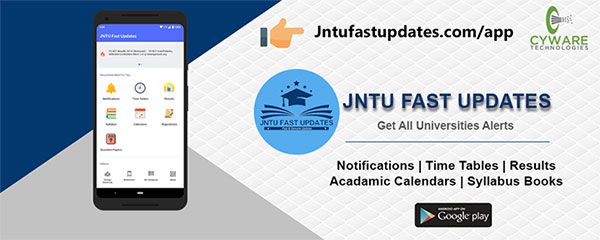JNTUK R16 3-2 OOPs through Java Material PDF Download
Students those who are studying JNTUK R16 ECE, EEE Branch, Can Download Unit wise R16 3-2 OOPs through Java Material/Notes PDFs below.

JNTUK R16 3-2 OOPs through Java Material PDF Download
OBJECTIVES:
- Understanding the OOP’s concepts, classes and objects, threads, files, applets, swings and act.
- This course introduces computer programming using the JAVA programming language with objectoriented programming principles.
- Emphasis is placed on event-driven programming methods, including creating and manipulating objects, classes, and using Java for network level programming and middleware development
UNIT-1
Introduction to OOP, procedural programming language and object oriented language, principles of OOP, applications of OOP, history of java, java features, JVM, program structure. Variables, primitive data types, identifiers, literals, operators, expressions, precedence rules and associativity, primitive type conversion and casting, flow of control.
UNIT-2
Classes and objects, class declaration, creating objects, methods, constructors and constructor overloading, garbage collector, importance of static keyword and examples, this keyword, arrays, command line arguments, nested classes.
UNIT-3
Inheritance, types of inheritance, super keyword, final keyword, overriding and abstract class. Interfaces, creating the packages, using packages, importance of CLASSPATH and java.lang package. Exception handling, importance of try, catch, throw, throws and finally block, user-defined exceptions, Assertions.
UNIT-4
Multithreading: introduction, thread life cycle, creation of threads, thread priorities, thread synchronization, communication between threads. Reading data from files and writing data to files, random access file,
UNIT-5
Applet class, Applet structure, Applet life cycle, sample Applet programs. Event handling: event delegation model, sources of event, Event Listeners, adapter classes, inner classes.
UNIT-6
AWT: introduction, components and containers, Button, Label, Checkbox, Radio Buttons, List Boxes, Choice Boxes, Container class, Layouts, Menu and Scrollbar.
TEXT BOOKS:
- The complete Reference Java, 8th edition, Herbert Schildt, TMH.
- Programming in JAVA, Sachin Malhotra, Saurabh Choudary, Oxford.
- Introduction to java programming, 7th edition by Y Daniel Liang, Pearson.
REFERENCE BOOKS:
- Swing: Introduction, JFrame, JApplet, JPanel, Componets in Swings, Layout Managers in
- Swings, JList and JScrollPane, Split Pane, JTabbedPane, JTree, JTable, Dialog Box.
OUTCOMES:
- Understand Java programming concepts and utilize Java Graphical User Interface in Program writing.
- Write, compile, execute and troubleshoot Java programming for networking concepts.
- Build Java Application for distributed environment.
- Design and Develop multi-tier applications.
- Identify and Analyze Enterprise applications.

320-x100(1).gif)
